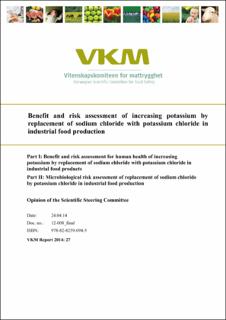Benefit and risk assessment of increasing potassium by replacement of sodium chloride with potassium chloride in industrial food Production. Opinion of the Scientific Steering Committee
Frølich, Wenche; Andreassen, Åshild Kristine; Arukwe, Augustine; Bernhoft, Aksel; Dahl, Knut Helkås; Eckner, Karl Fredrich; Haugen, Margaretha; Hemre, Gro Ingunn; Iversen, Per Ole; Kapperud, Georg; Källqvist, Torsten; Krogdahl, Åshild; Lassen, Jørgen Fr; Lunestad, Bjørn Tore; Lyche, Jan Ludvig; Næss, Bjørn; Rosnes, Jan Thomas; Steffensen, Inger-Lise; Skåre, Janneche Utne; Sundheim, Leif; Torrissen, Ole; Østerås, Olav; Alexander, Jan
Research report
Published version
Permanent lenke
https://hdl.handle.net/11250/3042619Utgivelsesdato
2014Metadata
Vis full innførselSamlinger
Originalversjon
Frølich, W., Andreassen, Å. K., Arukwe, A., Bernhoft, A., Dahl, K. H., Eckner, K. F., ... & Alexander, J. (2014). Benefit and risk assessment of increasing potassium by replacement of sodium chloride with potassium chloride in industrial food Production. Opinion of the Scientific Steering Committee. VKM Report.Sammendrag
The two salts NaCl and KCl appear to function similarly in controlling growth of microorganisms in foods. However, present information is limited. As KCl, in the present context, may fully or partially replace NaCl at the same molarity, there should be no need to evaluate the consequences of different replacement scenarios further as the food safety most likely would not be altered. The microbiological part of this risk assessment only concerns possible effects of partial or full replacement of NaCl with KCl on the survival, growth or toxin production by food-borne bacteria. NaCl has an impact during processing of food. The preservative functionality of KCl has been shown to be equivalent to that of NaCl when calculated on molar basis (Bidlas&Lambert 2008) thus not increasing risk for survival, growth or toxin production by food-borne bacteria.. Irrespective of food group, NaCl can be fully or partially replaced by KCl at the same molarity, without altering microbiological food safety
